It’s never too early to begin preparing for holiday gifting orders.
Consumers learned that the hard way in 2020 when the COVID-19 pandemic disrupted the supply chain. Because of lengthy shipping delays and production slowing or even stopping altogether, distributors either scrambled to sell whatever was left in inventory or hoped for a miracle.
Although the promotional products industry has thankfully moved on from that rough patch, distributors still encourage their clients to avoid waiting until the last minute to make their holiday gifting order. “I usually plan a mailing in early September and mention the benefit of ordering early for holiday items,” says Bob Baker, owner of Lockport, New York- based distributor Admark Promotional Marketing.
After all, Baker understands how much end users value holiday gifts. In fact, 80% consider a present from their employer to be meaningful, according to PPAI’s 2023 Holiday Gifting Survey.
The online survey captured insights from a nationally representative sample of more than 500 U.S. consumers between the ages of 18 and 74. The data collected from the survey digs deep into what types of holiday gifts consumers prefer, the importance of personalization and how these presents can influence brand perception.
What’s On Consumers’ Wishlists?
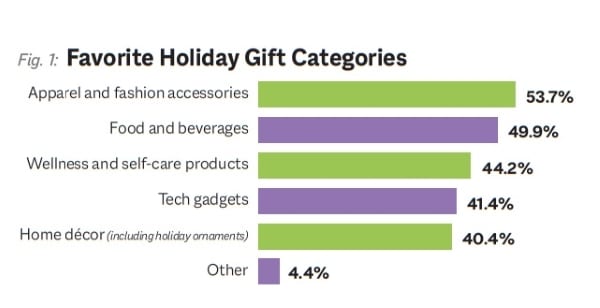
Peter Hawk, MAS, president of ASAP Promotions, a distributorship based in Cranberry Township, Pennsylvania, knows that a “one-size-fits-all” solution doesn’t exist for holiday gifts.
“So many questions have to be answered before you give gift suggestions to your client,” Hawk, a 41-year industry veteran, says. “Most importantly, your client has to know what their employee wants.”
According to the survey, more than half (53.7%) of consumers favor apparel and fashion accessories as holiday gifts (see Fig. 1), followed by food and beverages (49.9%), wellness and self-care products (44.2%), tech gadgets (41.4%) and home décor (40.4%).
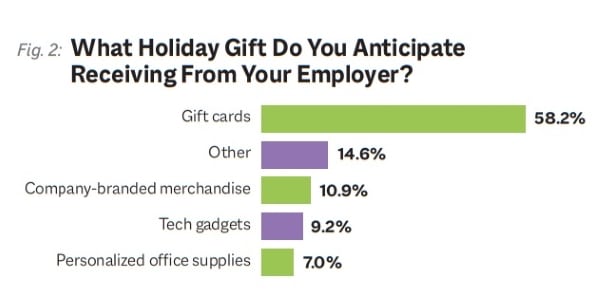
Despite consumers’ fondness for physical gifts, only a little more than half (53.5%) expect to receive a company-logoed holiday present from their employer. Meanwhile, 58% anticipate receiving a gift card from the company they work for (see Fig. 2).
“We’ve had clients consider going with gift cards, but if you build a gift program with thoughtfulness in curating gifts, recipients anticipate them much more each year and your program becomes iconic,” says Tom Hanchette, president and founder of Identity Works, a distributor based in West Salem, Wisconsin.
“We’ve had clients’ team members talk about gifts they received years ago,” he says. “They know much thoughtfulness and appreciation for them went into selecting those gifts. There’s no way you get that result with cash or gift cards.”
It’s The Thought That Counts
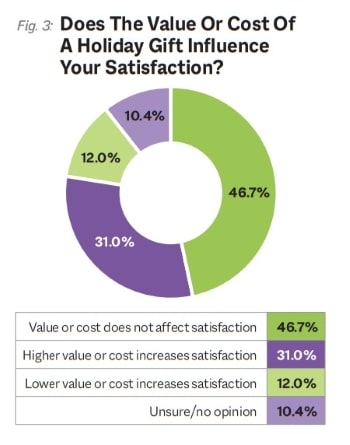
However, that doesn’t necessarily mean your clients have to break the bank. Nearly half (46.7%) of consumers say the cost of a gift doesn’t affect their satisfaction (see Fig. 3), and 36% say they’re more likely to appreciate practical gifts rather than luxurious ones, according to the survey.
Instead of worrying about going over budget for these tokens of appreciation, clients should focus on tailoring holiday gifts to their recipients’ interests. After all, more than three quarters (77%) of consumers say it’s important that holiday gifts reflect their individual preferences.
If clients want these presents to make their recipients truly feel special, then perhaps they should engrave or stitch the person’s name onto the gift. As many as 39% of consumers prefer personalized gifts (see Fig. 4), and more than half (51%) “highly appreciate” a personalized message with their gift.
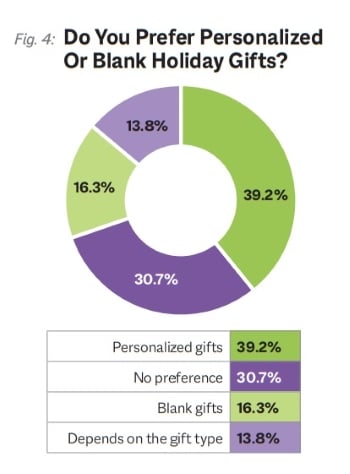
And it’s not just the gift itself that matters – 65% of consumers say packaging and presentation is important.
“Custom packaging helps denote quality and gives space for a longer message of appreciation,” Hanchette says. “Customization means planning and ordering early, which is the toughest challenge for some clients. More time equals more creative product and packaging options. Once a client gets that, things really move in the right direction, and they never look back.”
The Gift That Keeps On Giving
Don’t let clients fall into the trap of purchasing generic holiday gifts simply because it’s tradition. Whichever items they choose can impact their business – for better or worse.
Most consumers (85%) say the thoughtfulness of a holiday gift influences their perception of a brand, and 70.7% say the gift’s perceived value or uniqueness increases their brand loyalty.
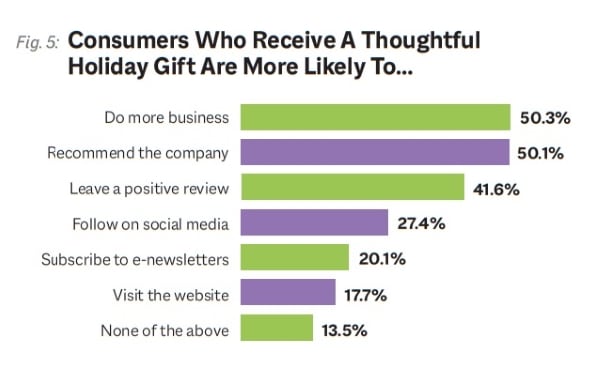
When receiving a thoughtful holiday gift from a company they’ve done business with, half of consumers are not only more likely to continue doing business with that company, but also recommend the company to others (see Fig. 5). Meanwhile, 41.6% say they’ll leave a positive review, 27.4% will follow the company on social media, 20% will visit the company’s website, and 17.7% will go so far as to subscribe to its e-newsletter.
With emotions running high during the holiday season, clients have a golden opportunity to leave a positive, lasting impression on their employees, customers and peers. By choosing a thoughtful, personalized gift that the recipient will love, they’ll become intertwined in cherished memories like tinsel on a Christmas tree.
“It’s important that you give someone something that they consider quality,” Hawk says. “Who wants to get a tumbler that has a plastic liner and plastic lid? I always try to give the client the best quality item for their budget.”
Corrigan is a news editor at PPAI


